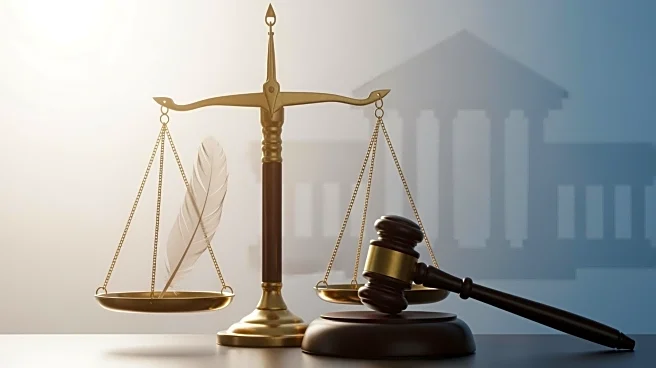What's Happening?
David Huerta, president of the Service Employees International Union (SEIU) California, initially faced a felony charge for allegedly obstructing federal authorities during an immigration raid in Los Angeles.
The charge has now been reduced to a misdemeanor, which carries a potential sentence of up to one year in federal prison. The incident occurred on June 6, when Huerta was accused of impeding federal officers executing a search warrant at a workplace, resulting in the arrest of numerous undocumented immigrants. Huerta's legal team argues that his actions were a lawful exercise of his First Amendment rights, as he was documenting and observing law enforcement activities. The case has drawn significant attention, with video footage of Huerta's arrest going viral and sparking public outcry. Prominent figures, including California Democratic Senators Adam Schiff and Alex Padilla, have called for a review of the arrest, highlighting concerns over the treatment of Huerta and the broader implications for civil liberties.
Why It's Important?
The reduction of charges against Huerta underscores ongoing tensions between labor unions, immigrant rights advocates, and federal immigration enforcement. This case highlights the potential for legal actions to be perceived as politically motivated, particularly against individuals who are vocal critics of immigration policies. The outcome of Huerta's case could set a precedent for how similar incidents are handled in the future, impacting the relationship between law enforcement and advocacy groups. It also raises questions about the balance between national security and the protection of constitutional rights, particularly the right to protest and document government actions. The case has mobilized union members and civil rights activists, emphasizing the role of organized labor in advocating for immigrant communities and challenging federal policies perceived as unjust.
What's Next?
Huerta's legal team is seeking a swift trial to contest the charges, aiming to clear his name and challenge the basis of his arrest. The case is likely to continue drawing public and political attention, with potential implications for future immigration enforcement actions and the rights of protesters. The outcome could influence how federal authorities approach similar situations and how advocacy groups strategize their responses to immigration raids. Additionally, the case may prompt legislative discussions on the protection of civil liberties during law enforcement operations, potentially leading to policy changes at the state or federal level.









